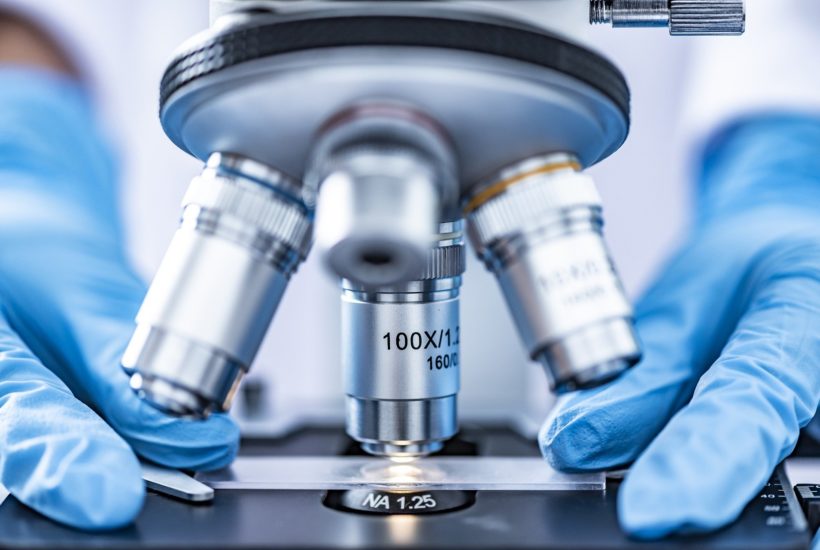Featured
Germany invests in East Africa to help it cope with COVID-19
In line with its strategy of widespread screening, Germany has provided East African countries with mobile laboratories to combat coronavirus. Berlin also announced further measures, noting that there is a need for training, test kits, PCR machines – all currently in short supply. Germany has invested €27 million in this program via KfW, in partnership with the East African Community.

Nine mobile laboratories initially planned to prevent all kinds of epidemics have been deployed in East African countries in partnership with Berlin. The German development bank KFW is financing the project, which has been on track since 2018.
The Secretary General of the East African Commission, Liberat Mfumukeko, gave the details: “A total of nine mobile laboratories are being deployed in the partner states as follows: Republic of Burundi -1, Republic of Rwanda -1, Republic of South Sudan -1, Republic of Kenya -2, Republic of Uganda -2 and United Republic of Tanzania -2,” he reported in the media.
Find out how Germany is trying to help East African countries by investing in nine mobile laboratories and read the most important financial headlines with the Born2Invest mobile app.
KfW is also sending 18 PCR machines in Africa
In concrete terms, these mobile laboratories consist of a vehicle equipped with all the necessary equipment to carry out rapid detection tests for several infections such as Ebola. However, from now on, they will also “be used to diagnose COVID-19,” KFW said.
It should also be pointed out that the most reliable tests for the new coronavirus require a PCR (polymerase chain reaction) machine. The KfW project is supplying 18 PCR machines to mobile laboratories in East Africa.
These machines are “open systems,” explained Dr Muna Affara, one of the two coordinators of the German project. This means they can be used for a variety of diagnostic tests, including COVID-19 and other epidemics. “A PCR machine is a bit like an oven, you can cook several different dishes in the same place,” the doctor explained.
New methods for early detection
“This project, which aims to set up mobile laboratories to detect infectious diseases in the region, started in 2018, but comes at the right time to help fight the new coronavirus,” said Joachim Nagel, a member of the German Public Bank’s board of directors.
As proof, the ECA Secretary General also distributed personal protective equipment including gloves, gowns, masks and glasses. The aim is to be able to react as soon as an infection occurs. Suspect cases in remote areas were particularly problematic, as it took weeks to confirm them. Until now, blood samples from the region had to be taken from a reference laboratory in the capital or flown to more qualified laboratories elsewhere. Now, experts can provide reliable diagnoses within 24 hours.
Germany also invested in the training of specialists
Germany has invested €27 million in this program via KfW, in partnership with the East African Community. Germany has also trained laboratory experts from six countries, including Kenya, Burundi, Rwanda, South Sudan, Tanzania and Uganda, at the Bernhard-Nocht Institute for Tropical Diseases in Hamburg. “We shared the experience of three of our institute’s departments, namely virology, infection epidemiology and diagnostic development. These three areas are extremely important for the development of mobile laboratories,” explained Professor Jürgen May, Head of the Department of Epidemiology of Infectious Diseases at the BNITM.
During the four weeks the African experts spent in Hamburg, they learned how to quickly assemble a mobile laboratory stored in 15 boxes, then dismantle and recondition it and, if necessary, operate it with the help of electrical generators. These African specialists also received further training through a simulation exercise with WHO support in Arusha, Tanzania.
This mobile laboratory facility will soon be extended to three more countries.
Africa, the last frontier
Africa has so far been relatively little affected by the new coronavirus pandemic, with only 25,461 cases, according to a report by AFP based on official sources. However, the pandemic is still in its early stages on the continent, with the WHO warning of “worrying upward trends.”
Last Thursday, April 23rd, German Development Minister Gerd Mueller called on Berlin to invest up to $3.26 billion (€3 billion) more to help the poorest countries fight the pandemic. Otherwise, “uncontrollable movements of refugees” could be caused by the disease, he told the German media group Funke.
Joachim Nagel replied that “the poorest countries need support, especially now. Otherwise all the development progress made in recent years will be lost. It is therefore the right decision for Germany and Europe to set up comprehensive aid programs. Despite all the uncertainties and challenges currently facing Germany, we must not turn our backs to the world. It was appropriate and reasonable to close the borders to contain the virus. But we cannot afford to erect borders in our minds and blind ourselves to other countries and continents.”
Berlin wants to do more
Berlin announced further measures, noting that there is a need for training, test kits, PCR machines – all currently in short supply. “The training of laboratory experts in test preparation, performance and interpretation is one of the most important ways in which German development cooperation can currently help African countries respond to the pandemic,” said Dr Olivier Manigart, senior team leader of the Proalab project in the ECOWAS region.
Furthermore, in Ghana, the Kumasi Center for Collaborative Research in Tropical Medicine (KCCR) – a joint venture between the Kwame Nkrumah University of Science and Technology in Kumasi, the Ghanaian Ministry of Health and the German Bernhard-Nocht Institute for Tropical Medicine in Hamburg – was able to start testing the new coronavirus as soon as the first cases were reported in the country.
__
(Featured image by ckstockphoto via Pixabay)
DISCLAIMER: This article was written by a third party contributor and does not reflect the opinion of Born2Invest, its management, staff or its associates. Please review our disclaimer for more information.
This article may include forward-looking statements. These forward-looking statements generally are identified by the words “believe,” “project,” “estimate,” “become,” “plan,” “will,” and similar expressions. These forward-looking statements involve known and unknown risks as well as uncertainties, including those discussed in the following cautionary statements and elsewhere in this article and on this site. Although the Company may believe that its expectations are based on reasonable assumptions, the actual results that the Company may achieve may differ materially from any forward-looking statements, which reflect the opinions of the management of the Company only as of the date hereof. Additionally, please make sure to read these important disclosures.
First published in LePoint, a third-party contributor translated and adapted the article from the original. In case of discrepancy, the original will prevail.
Although we made reasonable efforts to provide accurate translations, some parts may be incorrect. Born2Invest assumes no responsibility for errors, omissions or ambiguities in the translations provided on this website. Any person or entity relying on translated content does so at their own risk. Born2Invest is not responsible for losses caused by such reliance on the accuracy or reliability of translated information. If you wish to report an error or inaccuracy in the translation, we encourage you to contact us.

-

 Crypto1 week ago
Crypto1 week agoBitcoin Rebounds Above $70K as Crypto Markets Show Fragile Signs of Recovery
-

 Crypto2 weeks ago
Crypto2 weeks agoCrypto Markets at a Crossroads as Bitcoin Slides to $75,000
-

 Biotech5 days ago
Biotech5 days agoEurope Launches Personalized Cancer Medicine Initiative
-

 Impact Investing2 weeks ago
Impact Investing2 weeks agoEnfinity Launches First Solar Plant in Italy with Microsoft

























